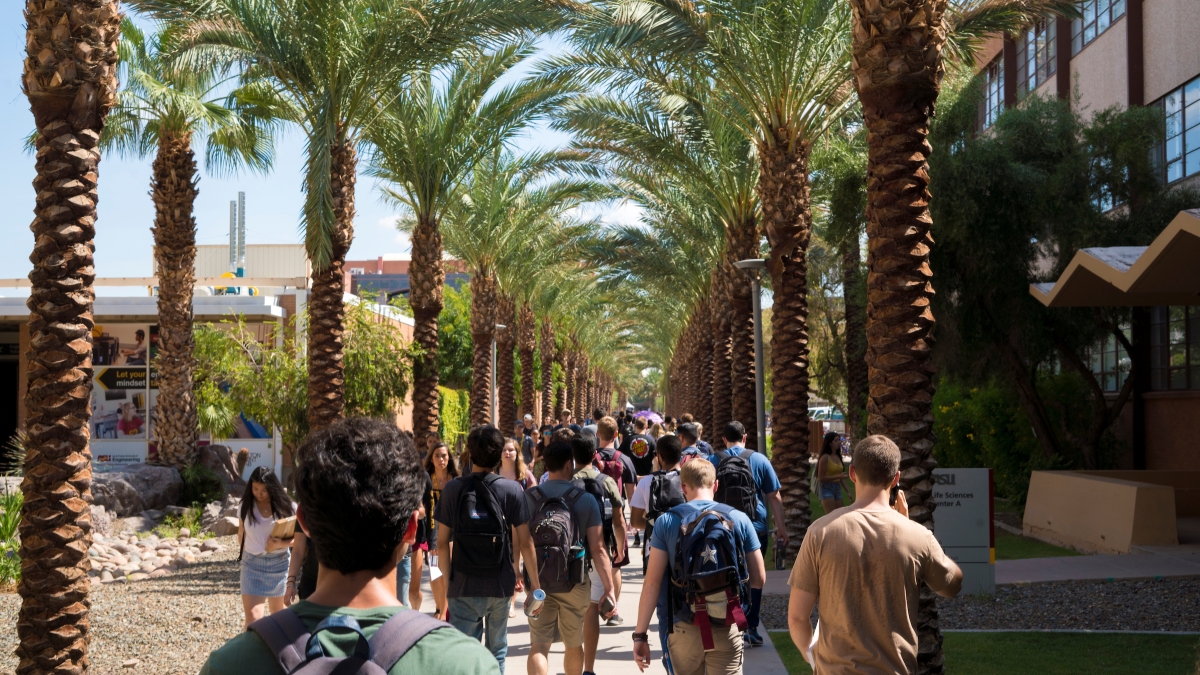Starting college is exciting and liberating, but sometimes it can be overwhelming or stressful. Many college students end up feeling depressed or anxious.
To understand this issue, Arizona State University scientists tracked how students' relationships with parents and friends affected the transition to college. The study, now available online, is in press at Developmental Psychology and is part of the larger ASU Support for Success Initiative for Students Transitioning to College (ASSIST) study.
“Undergraduate students in the U.S. struggle with depression and anxiety at alarming rates,” said Adam Rogers, who recently earned his doctorate at ASU and is first author on the study.
The researchers enrolled incoming ASU students during summer orientation sessions about college and followed the participants until after their first semester ended. Twice a week, the students answered mini questionnaires that were delivered by text message. These mini questionnaires, called electronic momentary assessments, gave the researchers information about how positive or negative a student was feeling on that particular day. In total, 174 student participants completed a maximum of 55 electronic momentary assessments over 28 weeks.
Thao Ha
“The electronic momentary assessments gave us unique data and let us look in detail at fluctuations in emotions during the transition to college,” said Thao Ha, assistant professor of psychology and senior author on the study.
The positive emotions measured with the momentary assessments were attentiveness, excitement and happiness. The negative emotions were feeling nervous, irritable, upset, depressed or lonely. Based on the electronic momentary assessments, the researchers found that as soon as college began, positive emotions started to steadily decrease. The negative emotions of the students were low overall and on average did not change much during the study.
On each momentary assessment, the student participants also answered questions about their relationships with parents and friends such as: How much time have you spent with your parent (or friend) today? How satisfied today are you with the relationship? Did you have a conflict? Did you feel pressured?
The relationships with parents and friends affected how positive or negative students felt on a given day. The participants who reported conflict or pressure in their relationships had increased negative emotions. What mattered the most about the relationships students had with their parents and friends was whether they were satisfied with the interactions.
“If participants indicated they had satisfactory contact with their parents or friends, they reported higher levels of positive affect and lower levels of negative affect,” Ha said. “Feeling pressured and experiencing conflict with both parents and friends had the opposite effect and actually was associated with increased negative affect after the transition to college.”
A goal of the ASSIST study is to prevent students from experiencing depression or anxiety during the transition to college. The researchers have developed an online intervention designed to provide parents effective communication tools to support their student as they navigate university life.
“This study is one of the first showing that healthy and supportive relationships with parents and friends are important for a student’s overall well-being during the transition to college,” Ha said. "These are pretty strong findings showing our social relationships during the college transition really matter for students’ mood."
Aaron Krasnow, associate vice president of ASU Counseling Services and Health Services, said the university has redesigned how it approaches orientation for new students based on the findings from this study.
“The findings from the ASSIST study have reaffirmed a general belief at ASU that it is important to ensure the entire family feels connected to the university,” he said. “Because families are the primary support systems for our students, we will continue to invest in educating parents and families so that they understand the context of the transition to the university environment.”
The ASSIST study was funded by ASU Educational Outreach and Student Services, the T. Denny Sanford School of Social and Family Dynamics, the Department of Psychology and the REACH Institute.
Kimberly Updegraff and Masumi Iida from the T. Denny Sanford School of Social and Family Dynamics, Scott Van Lenten from the ASU Department of Psychology, and Leah Doane and Will Corbin from the REACH Institute and the Department of Psychology also contributed to the study. The late Thomas Dishion initiated the ASSIST study.
Top photo: ASU students walk down Palm Walk on the Tempe campus on the first day of class Aug. 16. Photo by Marcus Chormicle/ASU Now
More Science and technology

ASU professor shares the science behind making successful New Year's resolutions
Making New Year’s resolutions is easy. Executing them? Not so much.But what if we're going about it all wrong? Does real change take more than just making resolutions?Michelle Shiota thinks so. …

ASU student-run podcast shares personal stories from the lives of scientists
Everyone has a story.Some are inspirational. Others are cautionary. But most are narratives of a person’s path, sometimes a circuitous one, from one point in their lives to another.A new podcast…

The meteorite effect
By Bret HovellEditor's note: This story is featured in the winter 2025 issue of ASU Thrive.On Nov. 9, 1923, Harvey Nininger saw his future explode across the Kansas sky. He would become perhaps the…

